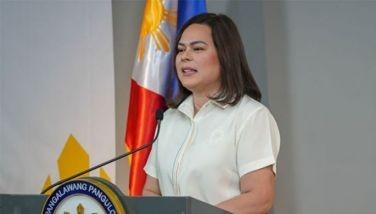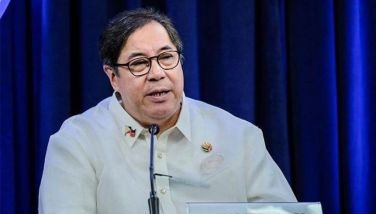Soliven dies in Japan
November 25, 2006 | 12:00am
At six o’clock last Thursday evening, Max Soliven called The STAR newsdesk from Tokyo to ask, as he always did when he was away on a trip, "What’s the big news there?"
Later in the evening his column came in by fax, an expectedly kilometric discourse on Japan under newly installed Prime Minister Shinzo Abe.
Twelve hours later, we got the news that our publisher and chairman had died of cardiac and respiratory arrest at the Narita Red Cross. He was 77.
He died doing what he loved best, and what he did better than most - he was a journalist to the end.
At the time of his death, Soliven was publisher and chairman of the board of The Philippine STAR, PEOPLE Asia magazine, and Mabuhay, the inflight magazine of Philippine Airlines. He was also chairman of the OB Montessori Center.
Although he did not hold office in Port Area —he wrote his column out of his home office on a manual typewriter, the ribbon of which was changed weekly — Soliven’s presence as publisher was imposing.
By phone, he checked up on stories, took reporters, deskmen and editors to task for slip-ups, but also offered praise for a job well done - but, he always cautioned, not too much praise, because "you might ask for a raise!" When he did come to the office though, he visited each department in the newsroom, chatted with everyone, and –although against his grain as an Ilocano –always coughed up money for merienda.
A legend and one of the last of his generation of journalists, Soliven was named Journalist of the Year four times, by the National Press Club and the Rotary Club of Manila.
At 27, he was editor and publisher of The Evening News, bringing it in 1960 from sixth to second in daily circulation. He was business editor of The Manila Times from 1957 to 1960, and one of its most celebrated and popular columnists until the paper was shut down by martial law in 1972.
He spent more than a decade of his career as a foreign correspondent. He covered the Vietnam war in 1954 and 1959, and was accused by President Ngo Dinh Diem of being an agent provocateur and expelled from Vietnam in 1960. But he returned to cover the rest of the war, including the 1968 Tet offensive and fighting in Laos and Cambodia.
In 1964, Soliven was in Beijing when China detonated its first atomic bomb, and scored an interview with Premier Zhou Enlai on the matter. The feisty Soliven also covered the 1965 "Gestapu" coup in Indonesia, getting the first interview with a then obscure Brig. General Suharto. He wrote a series of articles on the 1968 riots in Mexico City, and was in the Plaza de Tres Cultural when armored vehicles rolled in and shot down the student demonstrators.
He also covered the Middle East and Western Europe from his bureau office in Bonn, and came to know the capitals of Europe as well as he knew the cities and countrysides of Asia, which he called his "parish."
He worked as a stringer for The New York Times and Newsweek, and was a columnist for the South China Morning Post and the Bangkok Post.
But it is in Philippine journalism that Soliven had the biggest impact. He covered eight Philippine presidents, including President Arroyo’s father Diosdado Macapagal.
His column By the Way, began in the pre-martial law Manila Times and continued in The Philippine STAR until his death, was a must read for lawmakers and decision makers, diplomats and academicians, as well as anyone who wanted to know the lowdown on what was happening in the country.
His famous "Alikabok" inside scoops on goings-on at Malacañang, his freely dispensed "unsolicited advice" to presidents, his pull-no-punches barbs –punctuated by his trademark "sanamagan," "salamabit" and "susmaryosep" –made his six-days-a-week column the most riveting and informatively entertaining read around.
When Ferdinand Marcos declared martial law in 1972, Soliven was one of the first journalists to be arrested, picked up from his home at 2 a.m. by a detachment of soldiers. He was held in maximum security in Fort Bonifacio, sharing a cell with Benigno "Ninoy" Aquino Jr., sure that he would never make it out alive. When he was finally released, he was banned from writing and from traveling outside Metro Manila.
He founded the pioneering glossy magazines Sunburst and Manila, discovering and launching the careers of many photographers, models, entertainment personalities, and journalists.
Following Aquino’s assassination in 1983, Soliven wrote scathing articles against Marcos. With the late Betty Go Belmonte and Eugenia Apostol, he founded the Philippine Daily Inquirer in December 1985 and became the paper’s publisher. In July 1986, Soliven, Go-Belmonte, Art Borjal and Tony Roces founded The Philippine STAR, with Soliven as lead columnist and publisher.
Winner of numerous national and international awards, Soliven was most recently made an officer of the Legion d’Honneur by the French government. He also received the coveted Incomienda de la Orden Isabel la Catolica from His Majesty King Juan Carlos of Spain in March 2000.
He was a graduate of the Ateneo de Manila University, which honored him with its highest award, the OZANAM Award. He obtained a master’s in communications and political philosophy from Fordham University, New York, and took up post-graduate courses at the Johns Hopkins University and Harvard’s School of International Studies.
He is survived by his wife, UNESCO Philippines Secretary General Ambassador Preciosa Soliven, children Sara and Jon, Rachelle and Bob, Marinella and John, and eight grandchildren.
The family has accepted the government’s offer for him to lie in state at the St. Ignatius Cathedral in Camp Aguinaldo when his remains arrive from Japan.
Later in the evening his column came in by fax, an expectedly kilometric discourse on Japan under newly installed Prime Minister Shinzo Abe.
Twelve hours later, we got the news that our publisher and chairman had died of cardiac and respiratory arrest at the Narita Red Cross. He was 77.
He died doing what he loved best, and what he did better than most - he was a journalist to the end.
At the time of his death, Soliven was publisher and chairman of the board of The Philippine STAR, PEOPLE Asia magazine, and Mabuhay, the inflight magazine of Philippine Airlines. He was also chairman of the OB Montessori Center.
Although he did not hold office in Port Area —he wrote his column out of his home office on a manual typewriter, the ribbon of which was changed weekly — Soliven’s presence as publisher was imposing.
By phone, he checked up on stories, took reporters, deskmen and editors to task for slip-ups, but also offered praise for a job well done - but, he always cautioned, not too much praise, because "you might ask for a raise!" When he did come to the office though, he visited each department in the newsroom, chatted with everyone, and –although against his grain as an Ilocano –always coughed up money for merienda.
At 27, he was editor and publisher of The Evening News, bringing it in 1960 from sixth to second in daily circulation. He was business editor of The Manila Times from 1957 to 1960, and one of its most celebrated and popular columnists until the paper was shut down by martial law in 1972.
He spent more than a decade of his career as a foreign correspondent. He covered the Vietnam war in 1954 and 1959, and was accused by President Ngo Dinh Diem of being an agent provocateur and expelled from Vietnam in 1960. But he returned to cover the rest of the war, including the 1968 Tet offensive and fighting in Laos and Cambodia.
In 1964, Soliven was in Beijing when China detonated its first atomic bomb, and scored an interview with Premier Zhou Enlai on the matter. The feisty Soliven also covered the 1965 "Gestapu" coup in Indonesia, getting the first interview with a then obscure Brig. General Suharto. He wrote a series of articles on the 1968 riots in Mexico City, and was in the Plaza de Tres Cultural when armored vehicles rolled in and shot down the student demonstrators.
He also covered the Middle East and Western Europe from his bureau office in Bonn, and came to know the capitals of Europe as well as he knew the cities and countrysides of Asia, which he called his "parish."
He worked as a stringer for The New York Times and Newsweek, and was a columnist for the South China Morning Post and the Bangkok Post.
His column By the Way, began in the pre-martial law Manila Times and continued in The Philippine STAR until his death, was a must read for lawmakers and decision makers, diplomats and academicians, as well as anyone who wanted to know the lowdown on what was happening in the country.
His famous "Alikabok" inside scoops on goings-on at Malacañang, his freely dispensed "unsolicited advice" to presidents, his pull-no-punches barbs –punctuated by his trademark "sanamagan," "salamabit" and "susmaryosep" –made his six-days-a-week column the most riveting and informatively entertaining read around.
When Ferdinand Marcos declared martial law in 1972, Soliven was one of the first journalists to be arrested, picked up from his home at 2 a.m. by a detachment of soldiers. He was held in maximum security in Fort Bonifacio, sharing a cell with Benigno "Ninoy" Aquino Jr., sure that he would never make it out alive. When he was finally released, he was banned from writing and from traveling outside Metro Manila.
He founded the pioneering glossy magazines Sunburst and Manila, discovering and launching the careers of many photographers, models, entertainment personalities, and journalists.
Following Aquino’s assassination in 1983, Soliven wrote scathing articles against Marcos. With the late Betty Go Belmonte and Eugenia Apostol, he founded the Philippine Daily Inquirer in December 1985 and became the paper’s publisher. In July 1986, Soliven, Go-Belmonte, Art Borjal and Tony Roces founded The Philippine STAR, with Soliven as lead columnist and publisher.
Winner of numerous national and international awards, Soliven was most recently made an officer of the Legion d’Honneur by the French government. He also received the coveted Incomienda de la Orden Isabel la Catolica from His Majesty King Juan Carlos of Spain in March 2000.
He was a graduate of the Ateneo de Manila University, which honored him with its highest award, the OZANAM Award. He obtained a master’s in communications and political philosophy from Fordham University, New York, and took up post-graduate courses at the Johns Hopkins University and Harvard’s School of International Studies.
He is survived by his wife, UNESCO Philippines Secretary General Ambassador Preciosa Soliven, children Sara and Jon, Rachelle and Bob, Marinella and John, and eight grandchildren.
The family has accepted the government’s offer for him to lie in state at the St. Ignatius Cathedral in Camp Aguinaldo when his remains arrive from Japan.
BrandSpace Articles
<
>
- Latest
- Trending
Trending
Latest
































